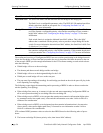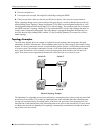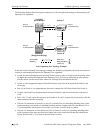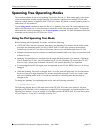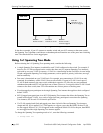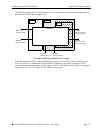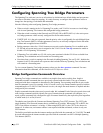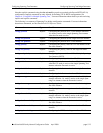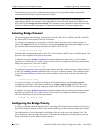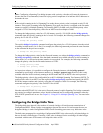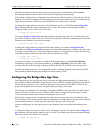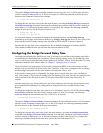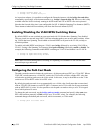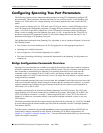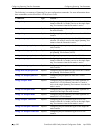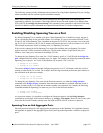
Configuring Spanning Tree Bridge Parameters Configuring Spanning Tree Parameters
page 5-14 OmniSwitch 6600 Family Network Configuration Guide April 2006
The following sections provide information and procedures for using implicit bridge configuration
commands and also includes explicit command examples.
Note. When a snapshot is taken of the switch configuration, the explicit form of all Spanning Tree
commands is captured. For example, if the bridge protocol for the flat mode instance was changed from
STP to MSTP, then bridge cist protocol mstp is the command syntax captured to reflect this in the snap-
shot file. In addition, explicit commands are captured for both flat and 1x1 mode configurations.
Selecting Bridge Protocol
The switch supports three Spanning Tree protocols: 802.1D (STP), 802.1w (RSTP), and 802.1s (MSTP).
By default, 802.1D is the protocol used for all instances.
To configure the Spanning Tree protocol for a VLAN instance when the switch is running in the 1x1
mode, enter bridge followed by an existing VLAN ID, then protocol followed by stp or rstp. For exam-
ple, the following command changes the protocol to RSTP for VLAN 455:
-> bridge 455 protocol rstp
Note that when configuring the protocol value for a VLAN instance, MSTP is not an available option. This
protocol is only supported on the flat mode instance.
In addition, the explicit bridge 1x1 protocol command configures the protocol for a VLAN instance
regardless of which mode (1x1 or flat) is active on the switch. For example, the following command also
changes the protocol for VLAN 455 to RSTP:
-> bridge 1x1 455 protocol rstp
To configure the protocol for the single flat mode instance when the switch is running in either mode (1x1
or flat), use the bridge protocol command but do not specify an instance number. This command config-
ures the flat mode instance by default, so an instance number is not needed, as shown in the following
example:
-> bridge protocol mstp
As in previous releases, it is possible to configure the flat mode instance with the bridge protocol
command by specifying 1 as the instance number (e.g., bridge 1 protocol rstp). However, this is only
available when the switch is already running in the flat mode and STP or RSTP is the active protocol.
In addition, the explicit bridge cist protocol command configures the protocol for the flat mode instance
regardless of which mode (1x1 or flat) is active on the switch. For example, the following command
selects the RSTP protocol for the flat mode instance:
-> bridge cist protocol mstp
Configuring the Bridge Priority
A bridge is identified within the Spanning Tree by its bridge ID (an eight byte hex number). The first two
bytes of the bridge ID contain a priority value and the remaining six bytes contain a bridge MAC address.
The bridge priority is used to determine which bridge will serve as the root of the Spanning Tree. The
lower the priority value, the higher the priority. If more than one bridge have the same priority, then the
bridge with the lowest MAC address becomes the root.



